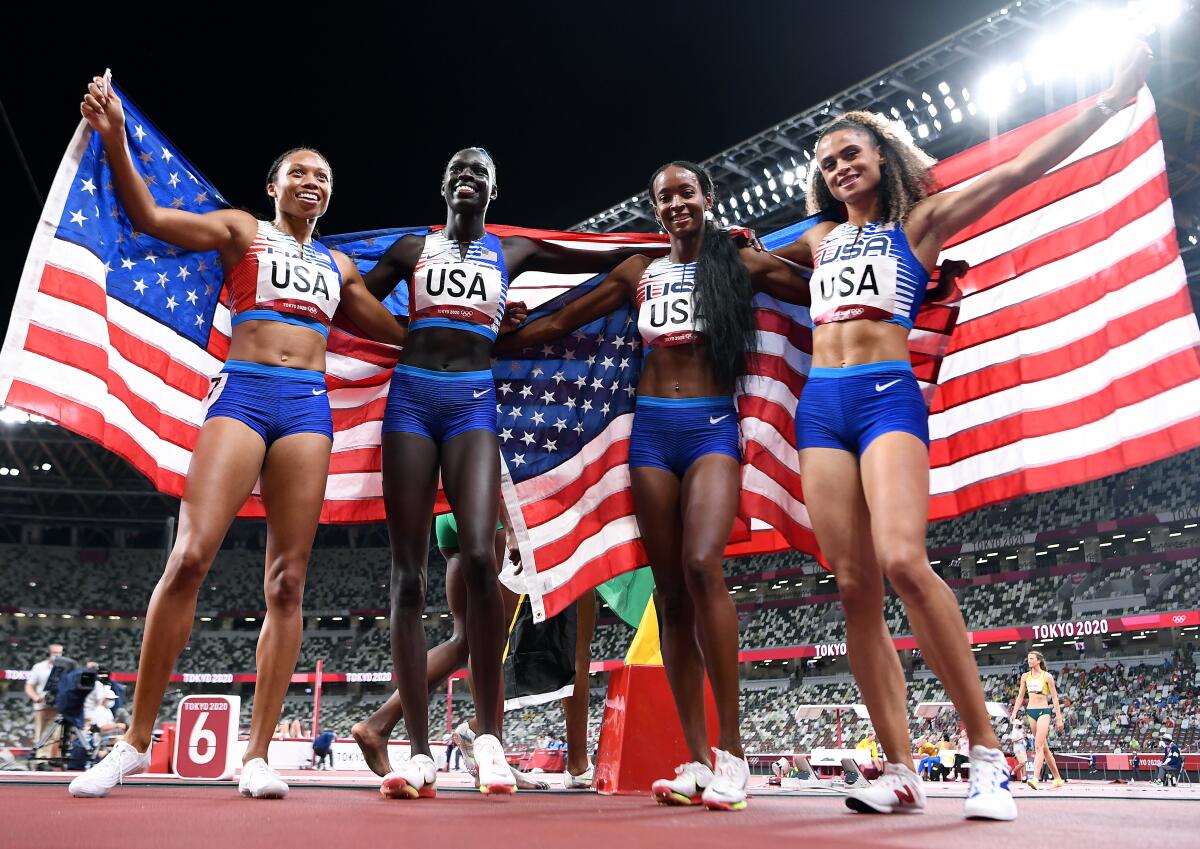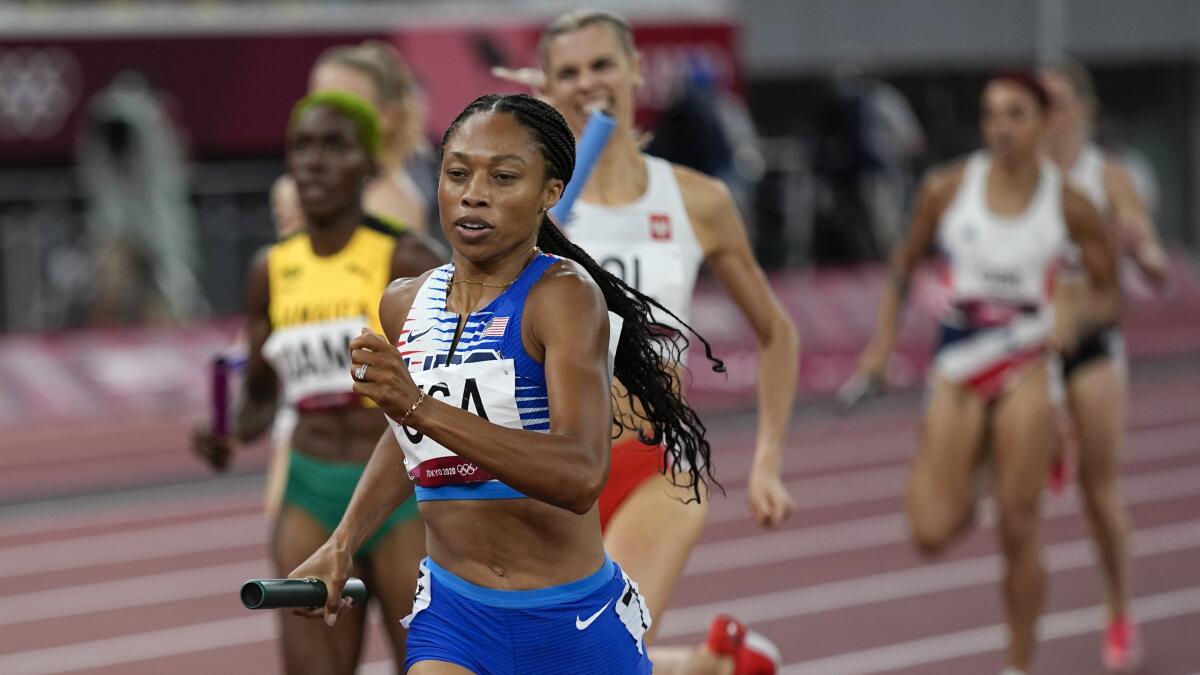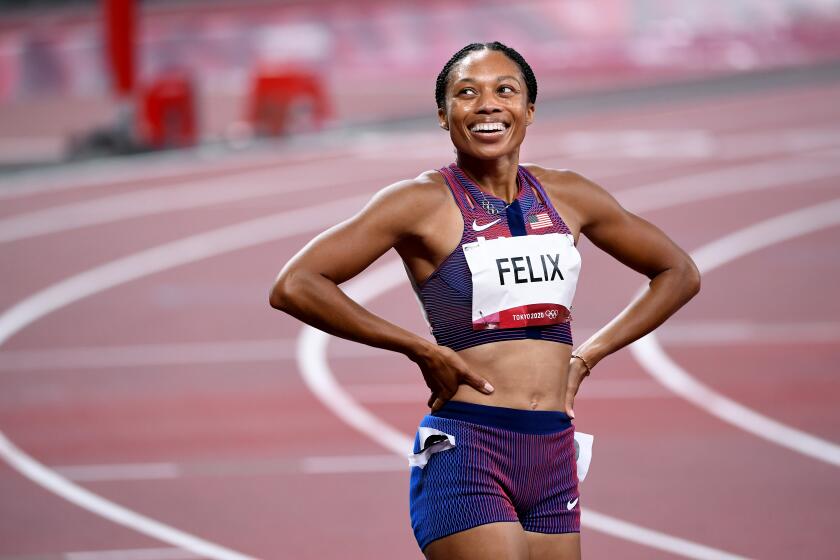Allyson Felix breaks record for most U.S. Olympic track medals, surpassing Carl Lewis

- Share via
TOKYO — Allyson Felix stood on the medal stand, closed her eyes and took in the Olympic moment one last time.
The most decorated athlete in United States track and field history had just completed the second leg of a gold-medal-winning 1,600-meter relay in the final Olympic race of her storied career.
On the last night of competition at Tokyo’s Olympic Stadium, the Southern California native claimed the spotlight one final time, eclipsing Carl Lewis by winning her 11th Olympic track medal and sixth as part of a relay.
“For me, I just came out really at peace and wanting to soak it all in,” Felix said. “It was really cool to come together and to get to close out the Olympic Games, and for me to close out my Olympic career.”
She was 18 and a year out of Los Angeles Baptist High when she went to the 2004 Athens Olympics and won her first medal. She has worked steadily to push past injuries and skeptics, earning five trips to the Olympics. When the COVID-19 pandemic shut down access to her normal UCLA training grounds, the Santa Clarita resident’s high school — now called Heritage Christian School — invited her to train on the track it had named for her.
While delaying the Olympics one year helped some athletes, it did not seem time was on Felix’s side. Many questioned whether she’d even qualify for Tokyo at age 35. But she has defied expectations her entire career. She showed unique discipline as a high school prodigy who never lost focus and turned an emergency caesarean section in 2018 into inspiration to fight for female athletes’ rights and better maternal healthcare for Black women.
The shy preacher’s daughter who was nicknamed “Chicken Legs” refused to give up and smashed all expectations, leaving Tokyo with two medals, the American track and field career record and vindication.
Saturday was also, finally, a night of celebration and redemption for the U.S. men’s team.
Michael Cherry, Michael Norman, Bryce Deadmon and Rai Benjamin combined to do what no American sprinter, middle-distance or long-distance runner was able to achieve: win a gold medal.
L.A. native leaves legacy as an advocate for better medical treatment for Black women during pregnancy and equitable treatment for all female athletes.
Their impressive victory in the 1,600-meter relay helped U.S. runners avoid a gold-medal shutout.
“This sport is really unforgiving,” Benjamin said. “And it’s just amazing to come out here and win a gold medal considering what the banter was back home, especially given our team is young and a lot of people don’t understand that.
“They’re just used to seeing USA going out and winning gold. But they don’t understand that we’re in a transition period. And I’m just happy that we put the right personnel out there and we were able to come out with a gold medal.”
The Tokyo Games will be remembered for the pandemic that postponed them for a year and the absence of spectators. Track and field fans also will note the divergent performances of the U.S. women’s and men’s teams.
The women won 15 medals, including individual golds by Athing Mu in the 800 meters, Sydney McLaughlin in the 400-meter hurdles, Valarie Allman in the discus and Katie Nageotte in the pole vault.
Felix, Muhammad, Mu and McLaughlin each won two medals.
“The women showed up,” said Felix. “I think we’ve been showing up on the track, off the track, in all of the ways.

“I loved seeing it. Sitting back and watching each woman perform, it was inspiring. It was like, ‘OK, who’s up next?’ Kind of like a buzz.”
Until Saturday night, the buzz around the men’s team was entirely different.
The U.S. men won 10 medals but only two gold, their fewest gold medals in Olympic history, according to Olympics historian Bill Mallon. The previous low was four gold medals at the 2008 Games in Beijing and the 2012 London Games.
“It’s been a long championship, very emotional for all of us here,” Benjamin said.
Benjamin narrowly missed winning a gold in the 400-meter hurdles. He ran a time faster than the world record, only to finish behind Norway’s Karsten Warholm, who set a new world record.
The frustration reached an apex when the 400-meter relay team failed to qualify for the final, which drew heated criticism from Lewis on social media.
It made for a grueling week.
“It was a whole lot of that, a whole lot of second places, guys that were supposed to win got second and guys, unfortunately, who were supposed to medal didn’t,” Benjamin said. “As athletes, we all put pressure on ourselves.
“So no one comes here with the intention of losing. We all want to win, and that’s what we’re here for. So to be able to come out here and actually win a gold medal for Team USA and for ourselves is just amazing.”
Benjamin said casual observers do not realize that veteran Olympians such as Tyson Gay and Justin Gatlin are no longer in the fold for what is essentially “a brand-new track team for Team USA.”
“It takes time to be great,” Benjamin said, noting that retired Jamaican superstar sprinter Usain Bolt did not win a gold medal in his first Olympics.
“Everyone just has to be patient.”
There is no reason to wait on the women’s team.
Felix passed the baton of leadership to Dalilah Muhammad and next-generation stars McLaughlin and Mu.
McLaughlin, who celebrated her 22nd birthday Saturday, already is a star. Mu, at 19, is on the verge of joining her.
Muhammad, 31, sees a bright future.
“We’re all just looking forward,” she said, “to what’s next to come.”
More to Read
Go beyond the scoreboard
Get the latest on L.A.'s teams in the daily Sports Report newsletter.
You may occasionally receive promotional content from the Los Angeles Times.









